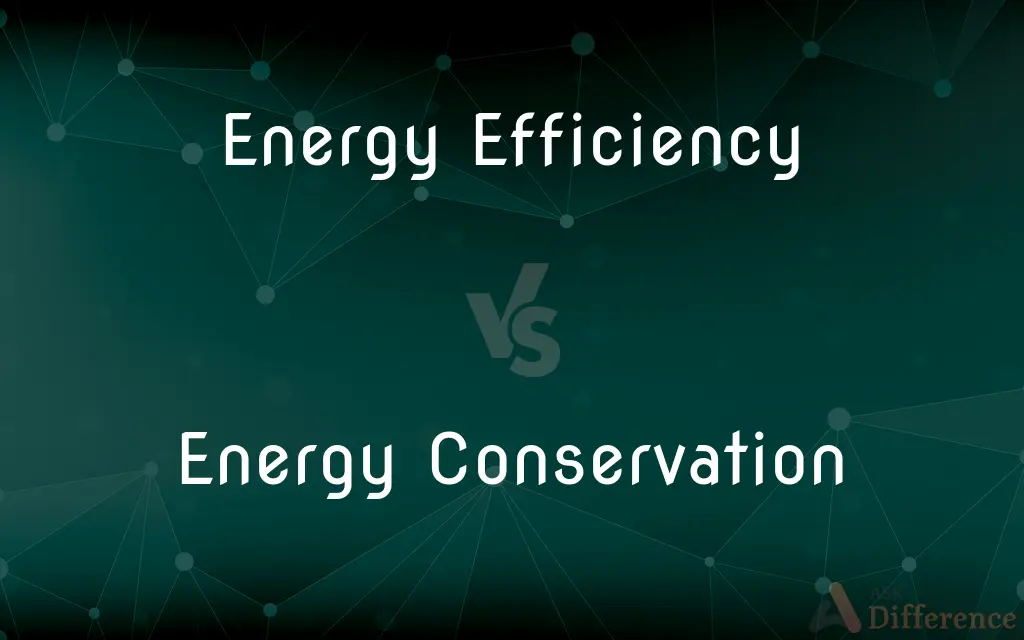Energy Efficiency vs. Energy Conservation — What's the Difference?
By Tayyaba Rehman & Urooj Arif — Published on March 2, 2024
Energy efficiency involves using less energy to perform the same task, enhancing technology or processes. While energy conservation focuses on reducing overall energy use, often through behavioral changes.

Difference Between Energy Efficiency and Energy Conservation
Table of Contents
ADVERTISEMENT
Key Differences
Energy efficiency refers to the use of technology or methods that require less energy to perform the same function. For instance, an energy-efficient LED light bulb uses significantly less electricity than a traditional incandescent bulb to produce the same amount of light. This approach not only reduces energy consumption but also lowers energy bills and decreases environmental impact.
Energy conservation, on the other hand, involves actions and strategies aimed at reducing overall energy use. This could mean turning off lights when not in use or lowering the thermostat to save on heating costs. Conservation efforts are primarily behavioral and require individuals or organizations to make conscious decisions to use less energy.
Energy efficiency often requires an initial investment in new technology or upgrades, while the long-term savings in energy costs and the reduction in carbon footprint can be substantial. Upgrading to energy-efficient appliances, for example, reduces the amount of energy needed for daily tasks. Energy conservation can be achieved with little to no cost, focusing instead on changing habits and practices, such as reducing unnecessary travel or optimizing the use of natural light.
Efficiency and conservation both play crucial roles in addressing energy consumption and environmental issues. By combining efficient technologies with conservation practices, individuals and organizations can maximize their impact on saving energy and mitigating climate change. For instance, using an energy-efficient washing machine and choosing to wash clothes in cold water (a conservation practice) can significantly reduce energy use and costs.
The choice between focusing on energy efficiency or conservation depends on various factors, including the availability of resources for investment in efficient technologies and the potential for behavioral change. While efficiency improvements may have a more immediate impact on reducing energy use, conservation efforts can significantly enhance those gains without requiring substantial financial investment. Ultimately, the most effective approach to reducing energy consumption and environmental impact involves a combination of both energy efficiency and conservation strategies.
ADVERTISEMENT
Comparison Chart
Definition
Using technology to perform the same task with less energy.
Reducing overall energy use through behavior changes.
Approach
Technological upgrades and improvements.
Behavioral adjustments and habit changes.
Initial Cost
Often requires investment in new technology or systems.
Minimal to no cost, focused on changing habits.
Impact
Reduces the amount of energy used per task.
Reduces total energy consumption.
Examples
LED lighting, energy-efficient appliances.
Turning off lights when not in use, reducing thermostat settings.
Compare with Definitions
Energy Efficiency
Often involves upgrading to more advanced technology.
Replacing an old HVAC system with a more energy-efficient model can significantly lower energy bills.
Energy Conservation
Immediately impacts energy consumption and costs.
Carpooling reduces the amount of fuel used, conserving energy and saving money.
Energy Efficiency
The practice of using less energy to provide the same service.
Installing double-glazed windows improves a home's energy efficiency by reducing heating needs.
Energy Conservation
Can be implemented without financial investment.
Lowering the thermostat in winter conserves energy and requires no cost.
Energy Efficiency
Focuses on optimization of energy use.
Energy-efficient washing machines use less water and energy per cycle, saving resources.
Energy Conservation
Important for environmental sustainability.
Reducing air travel conserves energy and decreases carbon footprints.
Energy Efficiency
Can lead to significant cost savings over time.
Energy-efficient light bulbs last longer and use less electricity, cutting costs.
Energy Conservation
Enhances the effectiveness of energy efficiency measures.
Using natural light instead of electric lighting conserves energy, amplifying the benefits of energy-efficient windows.
Energy Efficiency
Reduces environmental impact by lowering energy consumption.
Driving a fuel-efficient car reduces greenhouse gas emissions compared to older, less efficient models.
Energy Conservation
The practice of reducing energy use through behavioral changes.
Turning off lights when leaving a room is a simple act of energy conservation.
Common Curiosities
What is the main goal of energy efficiency?
The main goal of energy efficiency is to reduce the amount of energy required to perform a specific task or operation.
Can energy efficiency lead to increased energy consumption?
This can occur due to the rebound effect, where savings from efficiency lead to increased consumption elsewhere. However, the net effect usually still results in overall energy savings.
How can businesses improve their energy efficiency?
Businesses can upgrade to energy-efficient lighting, appliances, and machinery, and implement energy management systems to monitor and reduce energy use.
Is it cheaper to focus on energy efficiency or conservation?
Energy conservation typically requires less financial investment since it's based on changing behaviors rather than purchasing new technology.
How does energy conservation differ from energy efficiency?
Energy conservation focuses on reducing overall energy use through behavioral changes, while energy efficiency involves using technology to accomplish tasks with less energy.
Why is energy conservation important for the environment?
By reducing overall energy use, conservation efforts help lower greenhouse gas emissions and other pollutants, mitigating climate change and reducing environmental impact.
What role do governments play in promoting energy efficiency and conservation?
Governments can offer incentives for energy-efficient products and practices, set energy standards, and run educational campaigns to promote conservation.
Can energy efficiency improvements pay for themselves over time?
Yes, through reduced energy bills, many energy efficiency improvements can pay for themselves by saving more money over their lifespan than the initial investment cost.
How do energy efficiency and conservation impact energy costs?
Both strategies can lead to significant savings on energy bills—efficiency by lowering the energy used per task, and conservation by reducing overall energy use.
What is an example of energy conservation in daily life?
An example includes using a clothesline instead of a dryer, which conserves energy without the need for technological upgrades.
Share Your Discovery

Previous Comparison
Brown Bread vs. White Bread
Next Comparison
Brazilian Hairs vs. Mongolian HairsAuthor Spotlight
Written by
Tayyaba RehmanTayyaba Rehman is a distinguished writer, currently serving as a primary contributor to askdifference.com. As a researcher in semantics and etymology, Tayyaba's passion for the complexity of languages and their distinctions has found a perfect home on the platform. Tayyaba delves into the intricacies of language, distinguishing between commonly confused words and phrases, thereby providing clarity for readers worldwide.
Co-written by
Urooj ArifUrooj is a skilled content writer at Ask Difference, known for her exceptional ability to simplify complex topics into engaging and informative content. With a passion for research and a flair for clear, concise writing, she consistently delivers articles that resonate with our diverse audience.
















































